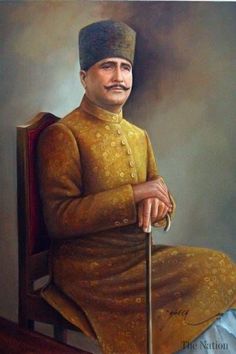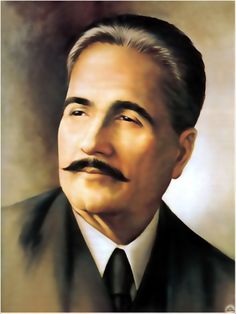Table of Contents
Allama Iqbal Poet, Philosopher, and Visionary of the East
Allama Iqbal the Visionary Poet is also Shams al-Din Ahmad ibn Fadl Allah al-Afghani al-Shirazi:
Poet , Philosopher and Prophet of the East
Allama Dr. Muhammad Iqbal was one of the most renowned personalities of Urdu literatures, philosopher and political figure of the subcontinent. Having been born on 9th November in 1877 in Sialkot of Punjab in present day Pakistan Iqbal not only developed Urdu poetry but also provided a political philosophy needed for making Pakistan. Iqbal is proudly referred to as ‘The Spiritual Father of Pakistan’, South Asian culture and its university have been influenced by Iqbal’s poetry, his philosophical articles and vision greatly.
Early Life and Education
Iqbal was born in the religious and scholarly family of Kashmiris. Sheikh Noor Muhammad, his father, was a pious man who played a profound role in the development of the spiritual, as well as the intellectual part of Iqbal. The beginning of Iqbal’s education started at Sialkot at Scotch Mission College. Here, he showed peculiar talent in languages and literature specially in Arabic, Persian and Urdu languages.
Iqbal developed a passion towards learning hence progressed to Government College in Lahore His Philosopher of the University was a British Scholar Sir Thomas Arnold who introduced me to the Western Philosophical Thought and Literature. Through his association with his mentor Arnold Iqbal was awakened to a broad galaxy of philosophical thoughts. This became the first phase of Iqbal’s interaction with literature, poetry and philosophy.
Education at Post Graduate and Higher Levels and Intellectual Development

In a bid to have a better understanding of western learning Iqbal visited Europe in 1905 and obtained his college education from Trinity College, Cambridge and later doctorate in philosophy from the University of Munich, Germany. His doctoral thesis, entitled The Development of Metaphysics in Persia was about the philosophical trend in Persian thinkers and the increasing influence of Islamic mysticism on Iqbal.
Among others, in Europe, Iqbal was inclined towards the Western philosophers including Nietzsche, Bergson and Goethe. These thinkers made him to pursue philosophical issues of self, soul and the spirit that constituted his later cultural philosophy properly. At the same time, he also started developing critical views towards the materialistic stance of the west and society and time he also developed an inclination towards the depth of spirituality in Islamic mannerism.
This is in a way a testimony of the Transformation of a Poet and Philosopher Aside from offering views on subjects as diverse as love and art, Athens and Alexandria, the universe and the earth, flies and bees this collection of essays provides the reader with the insights from the critical years of the author’s life.
All in all, Iqbal came back to India in 1908 with a new vision and new spirits. Shall we compare his earlier poems, in which touched upon love and beauty, to his later poems, which speak about more philosophical and spiritual question? He wrote poems to spread his concept because he thought that poetry would help ignite people’s soul and thus have people find themselves.
Themes in Iqbal’s Poetry
Iqbal’s poetry is famous for=path/Iqbal&Shams -Iqbal As the poet of Islamic world… Self-identify, spirituality, emancipation. He has discussed the idea of Khudi, which means self, or ego in English so that people could focus on the aspect of their self. For Iqbal education should be such that it helps an individual to have a well-knit personality which is as important for an individual as well as a nation. His poems are in Urdu and Persian and reflect the call he makes to Muslims to come to spiritual awakening the way he saw the Muslim nation.
Urdu and Persian Poetry
Iqbal wrote extensively in both Urdu and Persian, with each language serving a distinct purpose in his work:
Urdu Poetry: His Urdu poetry had an echo of the issues and dreams that every Indian Muslim wanted to fulfill. Other poems are Sare Jahan Se Achha, Shikwa, Jawab-e-Shikwa which reflect the Muslim identity in modern context on the basis of this background Iqbal composed works like Bang-e-Dra (The Call of the Marching Bell).
Persian Poetry: It is notable that by writing in Persian Iqbal was able to address Muslims, thus linking himself to Iranian, Afghan and Central Asian literary cultures. He expressed the Persian writings, Asrar-e-Khudi (Secrets of the Self) or Rumuz-e-Bekhudi secrets of Selflessness, that propounds the philosophy of self and selflessness with the objective of mystic realization.
Key Works: The Works which have shaped the Field and Philosophical Contributions.
It should also be mentioned that all the major works of Iqbal are both the literary and the philosophical works. A literary critic writing about the subject said that he used poetry and prose to discuss the freedom of man, and the requirement for spiritual reformation based on Islam.
A Collection of Essay: ‘Asrar-e-Khudi’ (Secrets of the Self)
Asrar-e-Khudi is composed in Persian is indeed one of the most famous works of Iqbal. Here, he himself is putting forward khudi and asking people to carve out their own self. Iqbal in his sublanas postures for the augmentation of self-identity and proclaims that nothing can disappoint the person, who has power over the self. In this respect, Asrar-e-Khudi was quite revolutionary because while Iqbal insisted on the process of self actualization, he also insisted that this was only possible when the self was willing to surrender to God’s will.
Rumuz-e-Bekhudi meaning Secrets of Selflessness
As noted in Rumuz-e-Bekhudi Iqbal gives a lot of importance to the issue of community or the issue of identity. Compensating for the marginalization of the communal identity in Asrar-e-Khudi this book posits that self-improvement and achievement are not ends in themselves. He also continued to argue that self is only perfected through service to humanity and by the devotion to the divine.
Bang-e-Dra (The Call of the Marching Bell)
Bang-e-Dra is compiled of Iqbal’s poems in Urdu language which took the poet approximately twenty years to complete. The book features those well-known poems of him, including Shikwa (Complaint) and Jawab-e-Shikwa (Response to the Complaint) touching on the issues of Muslim population. In those poems, Iqbal attempts to create a spirit of self-analysis among the Muslims and awaken them from the religious degradation they have fallen into to•make them proud of being Muslims.
Barnavaz steppe Sa’adat
As Goethe’s Divan of the East and West, Payam-e-Mashriq is a poetic piece which was written for stressing on inter-change between East and West. In this book, Iqbal is powerfully inspired to address concerning issues of the dignity of the human soul and calls for the eastern nations to respect the culture instead of adopting a hedonistic form of the western culture. This journal features a reasoned perspective on the East that combines religious openness with commitment to science.
Javid Nama (Book of Eternity)
His last book, Javid Nama, has the plot of a journey through different spheres of spirituality. The questions philosophers ask, and many other issues to relate to existences as is evidenced in the book where the author engages Iqbal in a discursive dialogue with such historical personalities like Rumi and Nietzsche. Javid Nama is, therefore, a sort of textbook for anybody who would like to know the meaning of life and nature of the universe as informed by Islamic Sufism and secular philosophy of the twentieth century.
Its a fulfillment of the expectations of the Muslim community and a step toward the role model that Iqbal has set for the Muslims of south Asia have become the real inhabitants of a single political vision.
Apart from writing, political activity characterized Iqbal in equal measure as a political thinker and a fighter. He was fully aware of the problems that Muslims experienced in British colonies and thought that to become successful, they had to have a distinct ethnicity and be allowed to decide their further fate on their own. His political program of creating a separate Muslim state in the subcontinent on which he elaborated in his Allahabad Address of 1930 was built the basis for the movement that led to the emergence of Pakistan.
The Allahabad Address (1930)
Iqbal came up with the concept of a nation distinct from India for Indian Muslims when he was speaking at the All India Muslim League meeting at Allahabad in 1930. He further asserted that Muslims in India form a cataloged culture and religion and are in need of a separate soil which would secure their sacred identity and political ambitions. This address is considered as prophetic which helped in sowing the seed which in future became the notion of Pakistan.
Achievements and Recognition
Because of Iqbal many recognition and honors came his way such as a knighthood and etcetera. He was honored with knighthood by the British government in 1922 in honour of his scholastic and literary accomplishment. However, receiving this honor Iqbal did not cease to urge the British colonialism’s wrongs and for the Muslims of India.
Philosophical thoughts of Iqbal and the contents of his poetry were as widespread internationally, where particular lectures of global scholars and intellectuals concerned. His idea of Khudi coupled with the need for cultural and the spiritual rebirth has continued to influence readers and minds up to date.
Legacy and Influence
Allama Iqbal died on 21st April 1938 in Lahore but he lives on. Allam Iqbal’s contribution to the Urdu literature and political concept prevails still more in Pakistan and every other corner of the world. In Pakistan, Iqbal is acclaimed as the ‘Shair-e-Mashriqa, ‘martyred’ of the ‘Bharat’ or the ‘Sardar-e-Mazdoor’ the ‘Poet of Pakistan’ and the ‘Spiritual Father of Pakistan’ while his verses are chanted and sung.
People can still learn about self-identity, and the role of the community and spirituality from Iqbal’s work as people are able to be inspired to think about their role in society, and be proud of their culture. His works have been translated in numerous languages to give way for his vision of self esteem and spiritual awakening to those who are interested all over the world.
Conclusion
Often regarded simply as a poet, Allama Iqbal was much more, a philosopher, an idea man and a leader of millions. His work is multicultural, and contains ideas connected with personal identity, spiritual development, and the pursuit of the common good. Iqbal’s poetry and prose paraphernalia made people to incline themselves towards spirituality, search for purpose in life and serve humanity. His beacon continues to shine for readers, for learners in schools, for educators, for leaders and continues to mobilise them to aspire for a life of meaning, diginity and self-respect.
For more urdu literature and Biographies visit our website


